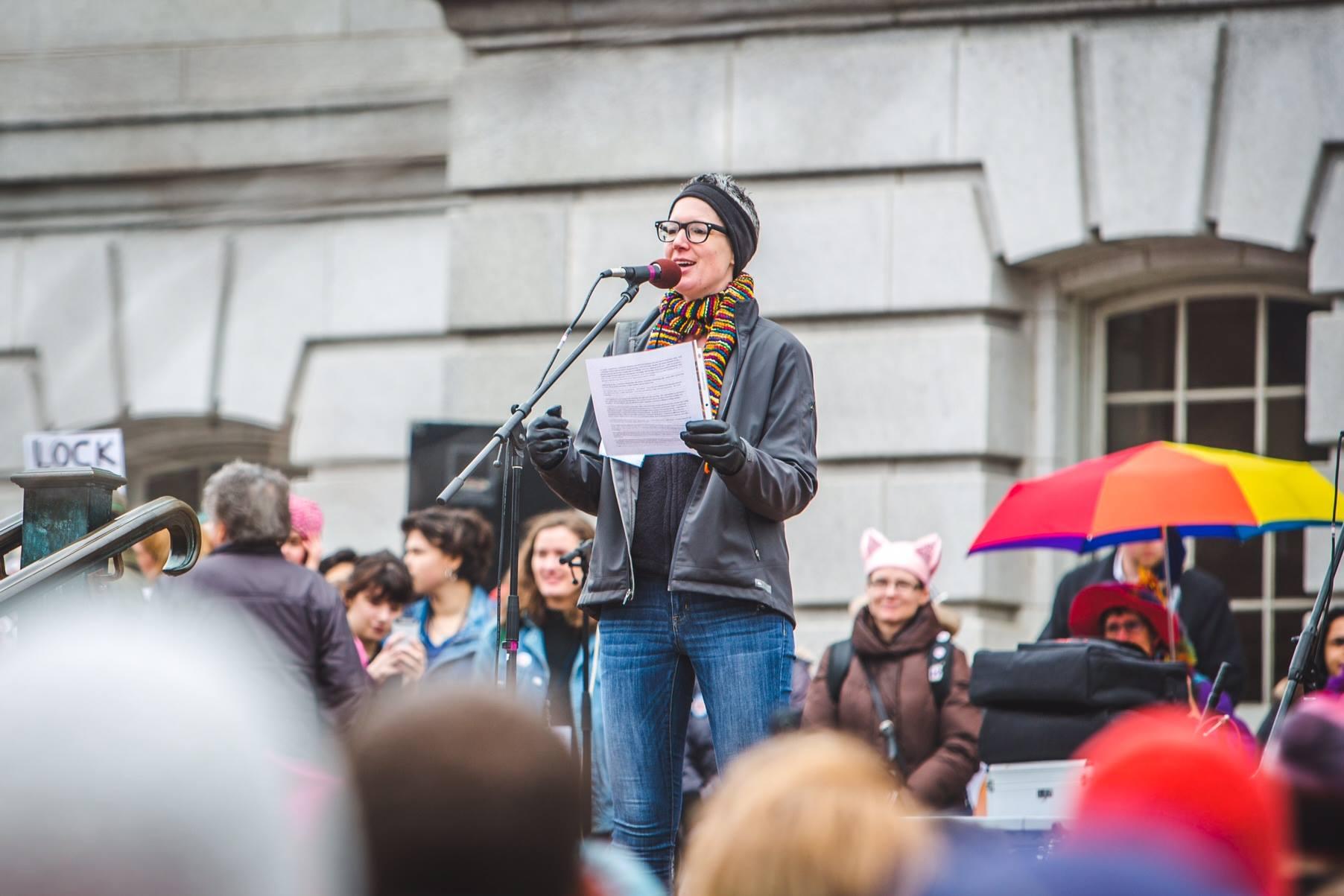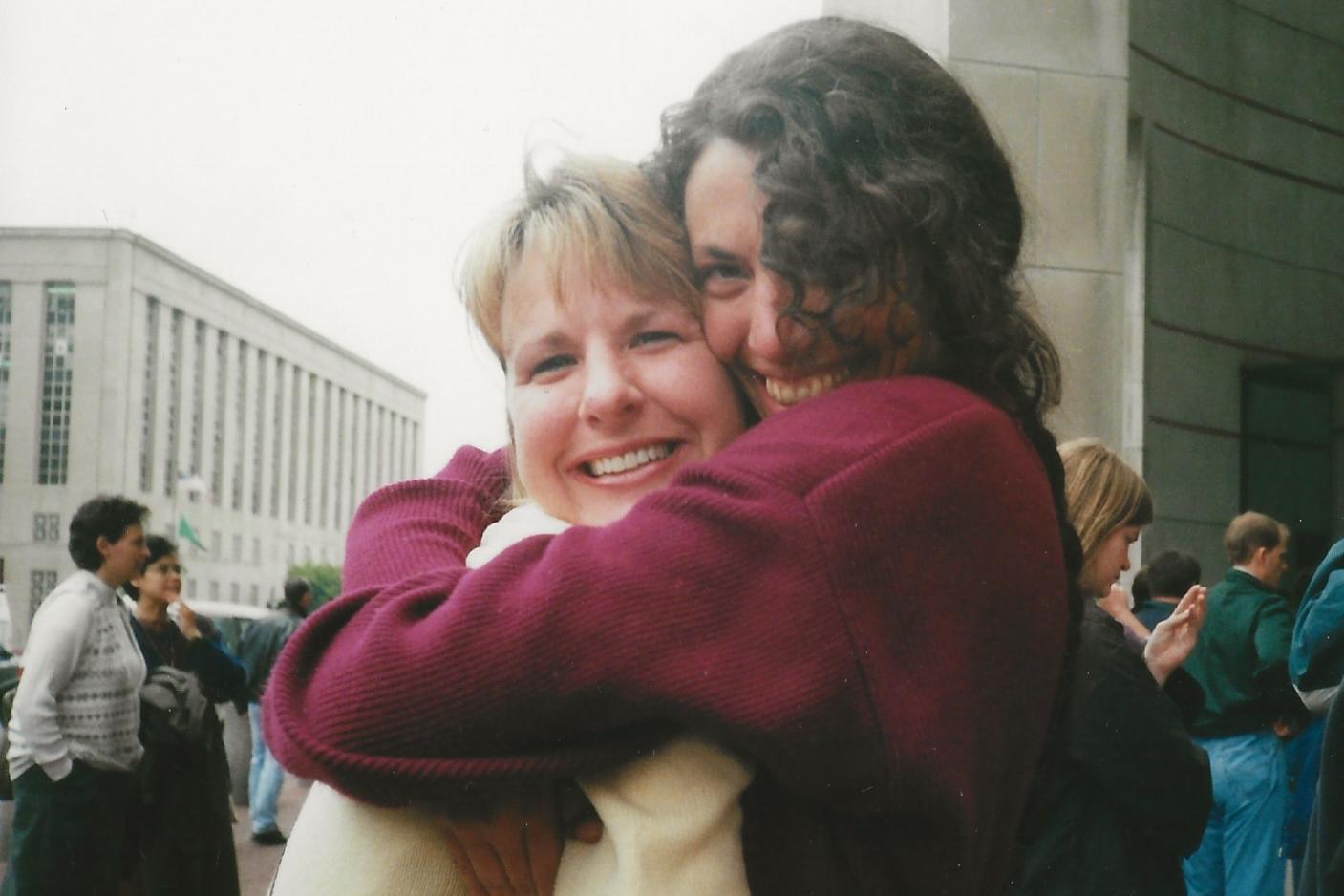
In Memoriam: Miss Tracey James

At a time when cross-dressing was criminalized, Miss Tracey dared to be the most visible transgender woman of her time.
Miss Tracey was born Peter James Kreisman on August 19, 1943. He grew up in Fond Du Lac with two brothers, one sister, and his parents Peter and Joyce. For awhile, he was sent to live with an aunt in Milwaukee, where he briefly attended Pius High School.
Peter would take the bus to downtown Milwaukee to explore places where gay people were rumored to be. Those places included the Antlers Hotel, the Royal Hotel, the Walgreens at 3rd and Wisconsin, and of course, The Mint Bar.
According to friends, Peter knew exactly who he was from a young age. At age 16, he dropped out of school to pursue the life he wanted.
“I knew who I was. But my family didn’t know who the hell I was,” he once told a friend.
Through well-intended word-of-mouth advice from their elders, the emerging trans community learned about the “three-piece rule,” which required citizens to wear three pieces of gender-appropriate clothing to police gender conformity. According to the three-piece rule, police officers were authorized to conduct gender inspections. These inspections, which were nothing more than targeted sexual assault, were supposedly conducted in embarrassing or humiliating public spaces. While no trace of this rule has been found on Wisconsin lawbooks, fear of its enforcement loomed over gender-diverse people for generations.
Friends for a lifetime
“Tracey and I were very close for 50 years,” said Marlo Rhodes. “So much happened in those 50 years. She was the one who first dressed me completely. She was the one who took me out all over the city.”
“I was working at the 2010 Club (2010 S. Kinnickinnic Ave.) the night I met her. It was a Halloween contest: Tracey was a contestant and I was a judge. Mickey Chanel, a Miss Gay Milwaukee, took the trophy, but Tracey came in second place. She asked for my address, because back then, we couldn’t afford home phones. The morning after, she showed up at my place with a bag of Polish sausage in one hand and two Pepsis in the other. We became inseparable."
"We were the best of friends and the worst of enemies. But we were also the ones who stayed together, as friends, for 50 years.”
“She always loved that I was a month older than her,” said Marlo, “until the day someone told us that whoever first put you in drag was called your ‘mother.’
"I looked at Tracey and said, ‘Mama!’ She didn’t like that very much.”
Reign of the Queen Bee
Miss Tracey found fame as the legendary “Queen Bee” of the Mint Bar (422 W. State St.) She was very close with owners Angelo and Bettie Aiello, who allowed her to bartend full-time in female expression. Tracey worked long shifts alone in the heart of a very busy downtown. However, she never reported any of the vice and crime that her co-workers sometimes experienced. Others were robbed – only blocks from the Central Police Station and County Jail – but never Tracey.
“Tracey was a tough cookie,” said a contributor. “She did not put up with any nonsense. You did not want to get on her bad side – for any reason – because she had a long memory and even longer grudges.”
Throughout the 1970s, Tracey was one of the most visible trans women in Milwaukee. Many remember her as the first transgender woman they’d ever met – sometimes without even knowing it.
“She entered the Miss Gay Wisconsin pageant as Miss Gay Mint,” remembered Marlo. “When they called for her height and weight, she said ‘more and plenty’ for her weight. The crowd howled! She didn’t have a ‘talent,’ so she was supposed to do a comic routine. She always had such a sharp, cutting edge humor. But once she got on stage, she froze up. Poor Tracey -- she came in last place! She never entered the pageant again.”
Tracey loved the women’s bars of the era, including the Nite Beat, Leaded Shade, Beer Garden, and Sugar Shack.
She didn't limit herself to gay and lesbian bars. She pushed the limits of where trans women could go, at a time when it could be dangerous to break the rules. She always dated black men and spent many nights at black bars on King Drive. As far as friends remember, she never experienced any exclusion or harassment in these spaces.
She was a well-respected regular at O’Connors, a straight bar across the street from This Is It that opened at 6 a.m.
“She’d be out all night, stop for some Real Chili, and then go to O’Connors for a Bloody Mary before heading home. The girl could put it away!"
Career and community
Tracey held several jobs over the years, including the stockroom at Johnnie Walker’s (3rd and Wells,) a telephone operator at Wisconsin Bell, and a processor at Blue Cross Blue Shield. It’s important to note that she was employed as Peter, not Tracey. It would have been impossible for a trans woman to hold these positions at that time. Only the Mint Bar allowed her to work "fully dressed."
Tracey lived at 24th and Cherry for over 25 years. Few people knew about Tracey’s active role in Milwaukee’s African-American community. She established such a great relationship with her landlord that the house was sold to Tracey when she died, on the condition it be sold upon Tracey’s death to benefit the original owner’s granddaughters.
She was heavily involved in the early years of SSBL with her good friends Tommy Salzseider and Tommy Theis. Tommy Theis always planned to open a bar, and wanted Tracey to manage it, but he was lost to the AIDS crisis before it happened. SSBL, now one of the longest-running gay sports leagues in the nation, celebrates its 47th year in 2024.
The End of the Mint
Tracey left the Mint Bar long before its June 1986 closing. Unfortunately, she was not invited to work at the new location (819 S 2nd St.) when it opened in 1987.
"Bettie was working with two younger men who were heavily influencing her business decisions," said Marlo. "They were not thrilled with the idea of a trans woman bartending at “their” gay bar -- even a devoted employee like Tracey."
Extremely hurt by this exclusion, Tracey avoided the new location for a long time. She was not alone: many long-time customers didn’t like the new location, the new ambience, or the new clientele.
Bettie, battling lung cancer, was forced to retire, and her partners quickly took over the bar. After the bar’s 40th anniversary in May 1989, a slow but gradual transition began that eventually retired the Mint Bar name forever. “The Mint Bar II” became “BJ’s Mint” and finally “BJ’s” in the blink of an eye.
By Bettie’s death in 1992, the Mint was already a fading memory, and a year later, “BJ’s” closed as well. We can only imagine Tracey felt some vindication.
Golden years
In later years, Tracey enjoyed C’est La Vie, M&M Club, This Is It, and Harbor Room. She had a preferred seat at This is It that she would claim every Saturday evening – and woe be anyone who might dare take that seat.
“I met Tracy when I first started coming to This Is It! bar almost 20 years ago,” said George Schneider. “She was already an icon at the bar, and everyone here respected her as the queen bee of the regulars.”
“Over the years, I learned a lot more about Tracy, and already coming from a position of respect for her, learning about her life journey and how brave and true to herself she was made me respect her even more. One of the things that I will never forget, is her affinity for red straws in her drinks. My late business partner, Joe, and I would make sure to stock red straws specifically for her, and Tracy, being the resourceful lady she was, would always have a back-up supply of red straws in case our vendors were unable to provide.”
“I will treasure and cherish our moments sitting together in her regular spot by the oval mirror at the bar and chatting the night away over lots of brandy.”
After the 2016 M&M Club Reunion, Tracey’s health began to decline rapidly.
She experienced a few small strokes, followed by two falls at home. Fortunately, she was found by the handyman who rushed her to medical care. She would later comment she “fell down at home and woke up in Fond du Lac.” She spent time in a nursing home while recovering.
Tracey was a proud homebody during the COVID pandemic. She told friends that when the pandemic was over, she would return to the scene. However, she became more frail, less mobile, and more socially withdrawn. By winter 2022, she was barely leaving the house at all.
Farewell to a friend
Tracey passed away on March 1, 2023. To date, the cause of death remains unknown. At the family’s request, no services were held and no obituary was published.
As a result, Tracey was gone for months before anyone knew she had died.
We felt it was important to honor a woman whose life was such a testament to the power of being seen. When we shared the news of her passing on social media in January 2024, we received multiple community testimonials.
Excerpts appear below:
- “Tracey was always impeccably dressed! She walked with a regal sense of self-respect. No one ever slighted her – or laughed at her. She demanded and received the dignity she deserved.” – Karen Valentine
- “Tracy was one of the most genuine, gracious people I have met in my life. Our community lost a wonderful person.” – Keane Weinreich
- “Such an amazing lady! True class and a heart of gold. I remember serving her cocktails at This is it and really getting to know her. A true gem.” – Trent Bychoice
- “I remember sitting and chatting with her one night at The Ballgame. Some rude guy came in and made a comment to her saying that she was fat. Tracy got up looked in a nearby mirror and said “Well shit! When the hell did that happen?!?! I was skinny when I woke up this morning! After that myself and some other friends of hers kindly escorted rude dude out of the side door onto the street.” – Jeff Paape
- “Sitting next to Tracy on a trip to San Francisco. She was wearing gigantic pink curlers under a scarf because she wanted to look pretty that night. Tracy didn't have to work hard on looking pretty. She was fabulous, sweet and had a heart of gold. Always looked elegant. Miss seeing her on Saturdays. RIP darling.” – Frank Villareal
- “I would see her at Goldmann's shopping with rollers in her hair and a scarf. Loved her because it was the 80's and she didn't care what people thought. People like her is why we have to keep fighting for our rights.” – Arnie Garcia
 Miss Marlo, Goldie Adams, and Miss Tracey (2020)
Miss Marlo, Goldie Adams, and Miss Tracey (2020)
recent blog posts
April 21, 2025 | Michail Takach
April 06, 2025 | Michail Takach
Camille Farrington & Vicki Shaffer: standing up for students
March 31, 2025 | Amy Luettgen
The concept for this web site was envisioned by Don Schwamb in 2003, and over the next 15 years, he was the sole researcher, programmer and primary contributor, bearing all costs for hosting the web site personally.




